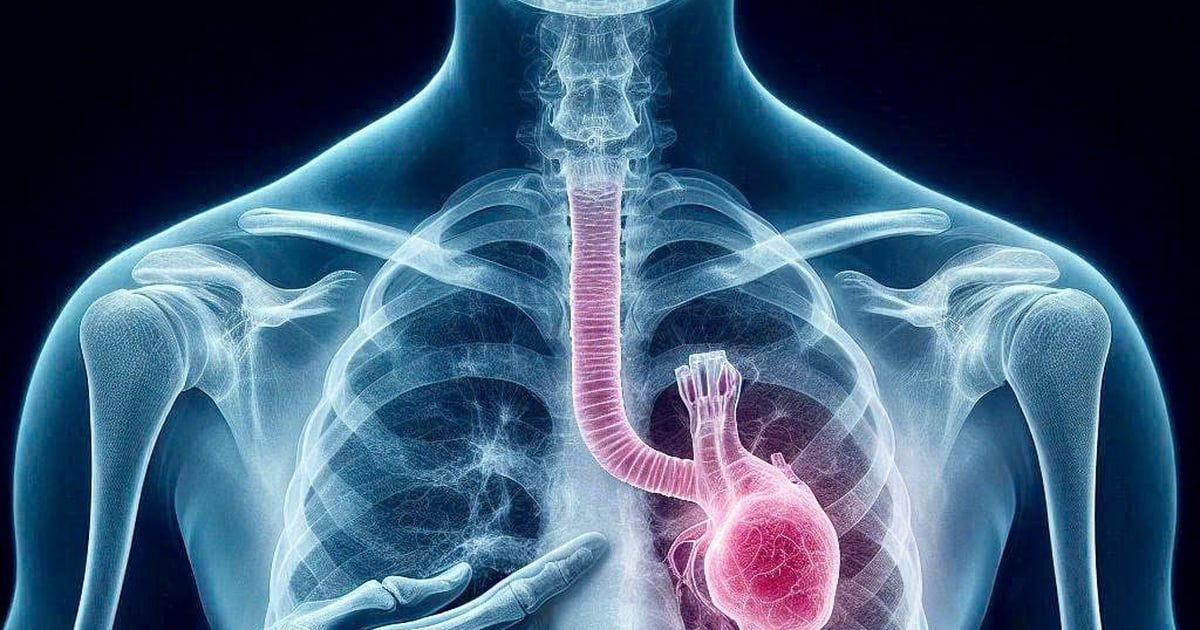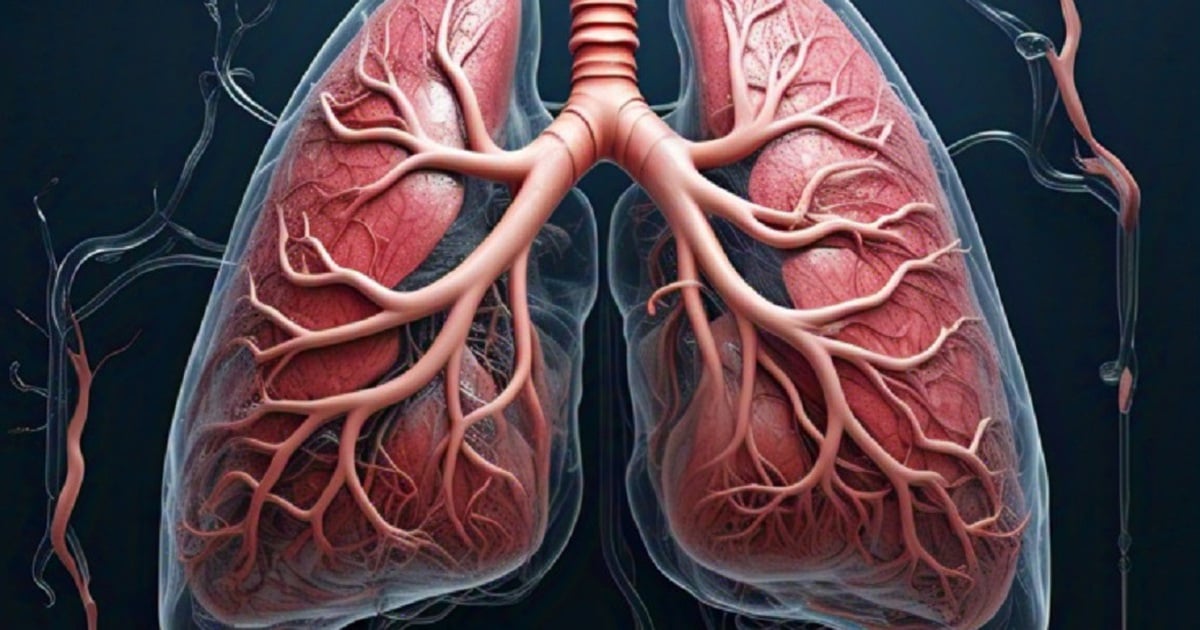Medical news August 1: Serious illness due to self-treatment after being bitten by a dog
Five days after being bitten on the index finger of his right hand by his family dog, a 65-year-old man in Hai Phong had a high fever, a swollen arm and was hospitalized.
Cellulitis from dog bite wounds
The Department of Gastrointestinal Infectious Diseases, Institute of Clinical Infectious Diseases, 108 Central Military Hospital has just admitted patient NVT, 65 years old from Hai Phong, admitted with high fever of 38 - 39.5 degrees, fatigue, the entire right hand, forearm, and arm were swollen, red, and painful. The palm and back of the hand had many pustules in patches measuring 1×2 cm on the surface of the skin, tight and hard, with yellow discharge.
 |
| Five days after being bitten on the index finger of his right hand by his family dog, a 65-year-old man in Hai Phong had a high fever, a swollen arm and was hospitalized. |
Medical history revealed that 5 days before admission, the patient was bitten by a dog on the index finger of his right hand, causing a small scratch and bleeding. The patient cleaned the soft tissue wound with saline.
After 5 days, the patient had swelling in the back of the right hand, severe pain, the swelling spread quickly to the forearm and arm, accompanied by fever and chills.
The patient used medicine at home but did not get better and was admitted to the Department of Gastrointestinal Infectious Diseases. He was diagnosed with cellulitis of the hand, arm and right forearm and had to be monitored for sepsis.
After 2 days of antibiotic treatment, the infection continued to progress, the inflammation continued to spread, and bilateral pneumonia appeared.
The patient was prescribed the maximum treatment regimen by the doctors, and the nurses took care of him attentively. The Department of Gastrointestinal Infectious Diseases coordinated with the Department of Interventional Diagnostic Imaging and the Department of Upper Limb Trauma and Microsurgery, the Institute of Orthopedics and Trauma to aspirate the abscess in the dorsum of the right hand, and drain the pus.
With close treatment and care, the patient gradually stabilized, the swelling in his right hand, arm and forearm was significantly reduced, the skin lesions gradually recovered, and his body temperature returned to normal.
According to doctors, cellulitis is an acute soft tissue infection. It is usually caused by Streptococcus or Staphylococci. Mild cases of local infection may cause redness in an area of skin. Severe cases cause fever and swollen regional lymph nodes, even septicemia.
Cellulitis is a bacterial infection of the deep layers of the skin that often comes on suddenly and is life-threatening if not treated promptly.
In case of noticing symptoms of the disease, people should go to a reputable medical facility for examination and treatment to prevent the risk of dangerous complications.
Lung cancer detection on coronary artery background
Mr. Tin, 76 years old, coughed up blood and was diagnosed with lung cancer. Before surgery, the doctor discovered a triple coronary artery disease that threatened a heart attack.
A month before, Mr. Tin (residing in Lam Dong) occasionally coughed up blood. The cough became more frequent, so he went to Tam Anh General Hospital in Ho Chi Minh City for examination. The doctor ordered him to have a chest X-ray, abdominal ultrasound, and chest CT scan, which discovered a 2×3 cm tumor in the lower lobe of the right lung, suspected of being malignant. The patient underwent a transmural biopsy (biopsy through the chest wall), which confirmed that the tumor was cancerous.
Dr. Nguyen Anh Dung, Head of the Department of Cardiovascular and Thoracic Surgery, Cardiovascular Center, Tam Anh General Hospital, Ho Chi Minh City, said that the team planned to surgically remove the entire lower lobe of the patient's right lung to prevent the spread of cancer cells.
Before surgery, he had paraclinical tests to assess his heart function. The results showed that he had severe heart failure (heart function - EF 20%, normal people > 50%).
The patient underwent coronary angiography to find the cause, and it was noted that the three coronary arteries were almost completely narrowed (80-90%). A consultation between Cardiology - Internal Cardiology - Vascular Intervention took place to find the most appropriate treatment plan for Mr. Tin.
Dr. Dung shared that when a patient has coronary artery disease with complications of heart failure and the threat of myocardial infarction, a lobectomy cannot be performed. Therefore, the doctor tries to clear the heart's blood vessels first, and waits for the heart's function to stabilize before treating the patient's lung tumor.
According to doctors, chronic coronary artery disease often occurs silently and progresses over decades, with few symptoms. Symptoms only appear when the disease progresses over time.
Therefore, everyone, especially those with risk factors for coronary artery disease such as old age, family history of early cardiovascular disease, overweight - obesity, sedentary lifestyle, frequent stress, unhealthy diet, sleep apnea, some internal diseases such as chronic kidney failure, diabetes, autoimmune diseases (rheumatoid arthritis, lupus erythematosus, scleroderma...), familial dyslipidemia... should have regular screening for early detection and timely treatment.
Aluminum poisoning due to folk remedies
Doctors at Bach Mai Hospital have just treated a 64-year-old female patient in Thanh Hoa who suffered aluminum poisoning but fortunately did not suffer any damage to related organs.
Dr. Nguyen Trung Nguyen, Director of the Poison Control Center, Bach Mai Hospital, said that two months before being admitted to the hospital, patient MTL (born in 1960) had continuous itching on the soles of his feet, hands, and whole body without rashes or hives. The patient had been to many places, including allergy specialists, but it did not help.
Taking the patient's medical history, the doctors learned that the patient had used alum for many years to treat underarm odor, so they ordered a test. The test results showed that the aluminum concentration in the blood and urine was higher than the allowable level.
According to the standard, the concentration of aluminum in the blood must not exceed 12mcg/liter and the urine must be below 12mcg/24 hours. For MTL patients, the blood index is 12.5mcg/liter and urine is 47.37mcg/24 hours. Notably, the patient's kidney function is still normal, meaning that the increase in aluminum concentration in the body is not due to kidney failure.
Patient MTL shared that for about 10 years now, she has been regularly using roasted alum, ground into powder and applied to her armpits twice a day to treat underarm odor. This is a folk remedy that many people use and spread. She herself did not think about the risk of poisoning.
The Director of the Poison Control Center said that this is a very rare case, the first time the Center has received a case of aluminum poisoning from the outside penetrating through the skin and the cause is from something very familiar, common, and widely used. Alum is potassium aluminum sulfate salt.
In fact, aluminum compounds are still used in the preparation and treatment of drugs that coat the gastric mucosa to treat stomach diseases and cure body odor.
Aluminum and aluminum compounds are also commonly used in food additives, in pharmaceuticals, in consumer products (such as kitchenware) and in drinking water treatment (water precipitators…).
However, according to studies to date, the amount of aluminum entering the body from these sources is insignificant, if the items, additives, and pharmaceuticals are manufactured according to standards and used according to the correct indications and dosages.
Aluminum poisoning often occurs in occupational environments and industries. People often come into contact with aluminum, inhale aluminum dust, and ingest it. People with kidney failure or on dialysis are at higher risk of aluminum poisoning.
This case is completely normal through the skin and kidney function, very rare. When aluminum enters the body, it will accumulate and attach to the bones, so excreting and eliminating aluminum from the body is very difficult and takes a long time.
In addition, aluminum poisoning causes hypochromic anemia similar to iron deficiency but is ineffective in treatment, causing osteomalacia, brain pathology (manifestations of speech disorders, difficulty speaking, stuttering, mutism, electroencephalographic abnormalities, muscle twitching, convulsions, dementia, difficulty maintaining posture and balance).
In cases where patients use roasted alum and powdered it for many years, it is inevitable that at some point the skin will become inflamed, have acne or scratches, so aluminum will be more easily absorbed into the body. This may be the reason for aluminum poisoning.
Doctor Nguyen recommends that people should not apply alum on the skin for a long time, and should use safe skin care products.



![[Photo] Opening of the 11th Conference of the 13th Party Central Committee](https://vstatic.vietnam.vn/vietnam/resource/IMAGE/2025/4/10/f9e717b67de343d7b687cb419c0829a2)

![[Photo] Unique folk games at Chuong Village Festival](https://vstatic.vietnam.vn/vietnam/resource/IMAGE/2025/4/10/cff805a06fdd443b9474c017f98075a4)
![[Photo] April Festival in Can Tho City](https://vstatic.vietnam.vn/vietnam/resource/IMAGE/2025/4/10/bf5ae82870e648fabfbcc93a25b481ea)
























































































Comment (0)